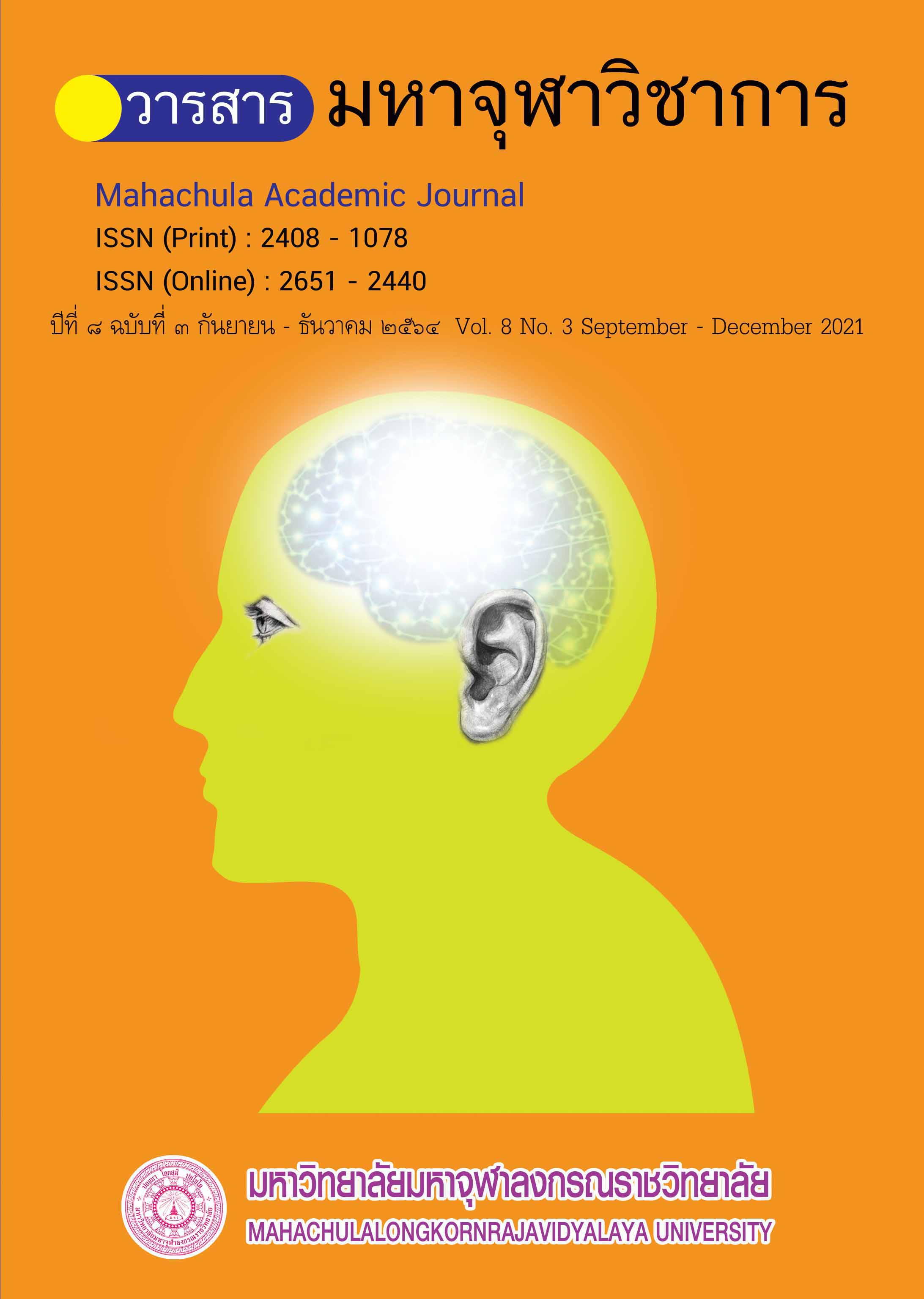Guidelines for the Implementation of Sufficiency Economy Philosophy in Vocational Education Administration in Saraburi Province
Main Article Content
Abstract
The purposes of this research were to (1) study the current state and the desired state of the implementation of Sufficiency Economy Philosophy in vocational education administration in Saraburi Province, and (2) study guidelines for the implementation of Sufficiency Economy Philosophy in vocational education administration in Saraburi Province.
The samples, selected by stratified random sampling, included 217 teachers and 6 administrators as informants. The research instruments were 5-point Likert scale dual-response questionnaires and structured interview forms. The data were analyzed using frequency distribution, percentage, mean, standard deviation, Priority Need Index (PNI), and content analysis.
The research result revealed that (1) the current state of the implementation of Sufficiency Economy Philosophy in vocational education administration in Saraburi Province as a whole was at the high level and the desired state of the implementation of Sufficiency Economy Philosophy in vocational education administration in Saraburi Province as a whole was at the highest level. (2) The guidelines for the implementation of Sufficiency Economy Philosophy in vocational education administration in Saraburi Province pointed out that reasonableness was the highest of priority needs index for the implementation of Sufficiency Economy Philosophy in vocational education administration in Saraburi Province. According to the guidelines, the administrators should (1) provide reasons for their decision makings based on reasonable criteria as well as be aware of the effects in various aspects to make their subordinates understand the reasons, and (2) listen to the educational personnel’s opinions and adhere to the good governance practices.
Article Details
References
กระทรวงศึกษาธิการ. ยุทธศาสตร์การขับเคลื่อนปรัชญาเศรษฐกิจสู่สถานศึกษา. กรุงเทพมหานคร : ม.ป.พ., พ.ศ.๒๕๕๑-๒๕๕๔.
คณะอนุกรรมการขับเคลื่อนเศรษฐกิจพอเพียง. กรณีศึกษาชุมชนเศรษฐกิจพอเพียง. กรุงเทพมหานคร : ม.ป.พ., ๒๕๔๙.
นภาดาว เกตุสุวรรณ. “ความสัมพันธ์ระหว่างภาวะผู้นำทางวิชาการของผู้บริหารสถานศึกษาพอเพียงกับการขับเคลื่อนปรัชญาเศรษฐกิจพอเพียงของสถานศึกษาพอเพียงในสังกัดสำนักงาน เขตพื้นที่การศึกษามัธยมศึกษา เขต ๔”. วิทยานิพนธ์การศึกษามหาบัณฑิต การบริหารการศึกษา. ปทุมธานี : บัณฑิตวิทยาลัย มหาวิทยาลัยเทคโนโลยีราชมงคลธัญบุรี, ๒๕๕๕.
นิภาพร กลิ่นเกตุ. “ยุทธศาสตร์การขับเคลื่อนปรัชญาของเศรษฐกิจพอเพียงกับประสิทธิผลของสถานศึกษา สังกัดสำนักงานเขตพื้นที่การศึกษาประถมศึกษาสุพรรณบุรี เขต ๑”. วิทยานิพนธ์ปริญญามหาบัณฑิต มหาวิทยาลัยเทคโนโลยีราชมงคล. กรุงเทพมหานคร : ม.ป.พ., ๒๕๕๗.
นภดล หงส์ศรีพันธ์. การปรับตัวของเกษตรกรสู่เกษตรกรรมทางเลือกตามแนวคิดเศรษฐกิจพอเพียง กรณีศึกษา หมู่บ้านป่าไผ่ อำเภอดอยสะเก็ด จังหวัดเชียงใหม่. เชียงใหม่ : ม.ป.พ., ๒๕๕๒.
ปรียานุช พิบูลสราวุธ. “คลังหลวงกับหลักปรัชญาของเศรษฐกิจพอเพียง”. โครงการวิจัยเศรษฐกิจพอเพียง. กรุงเทพมหานคร : ม.ป.พ., ๒๕๕๑.
พัชฎา วะไลใจ. “การศึกษาปัญหาการจัดการศึกษาตามหลักปรัชญาของเศรษฐกิจพอเพียงในโรงเรียน สังกัดสํานักงานเขตพื้นที่การศึกษาชลบุรีเขต ๒”. วิทยานิพนธ์การศึกษามหาบัณฑิต การบริหารการศึกษา. บัณฑิตวิทยาลัย : มหาวิทยาลัยบูรพา, ๒๕๕๓.
พิมลพรรณ เพชรสมบัติ. การวิจัยทางการบริหารการศึกษา. กรุงเทพมหานคร : ทริปเพิ้ล เอ็ด ดูเคชั่น, ๒๕๖๑.
สุเมธ ตันติเวชกุล. การดำเนินชีวิตในระบบเศรษฐกิจพอเพียงตามแนวพระราชดำริ. นิตยสารเทศาภิบาล, ๒๕๔๒.
บวร เทศารินทร์. บทบาทหน้าที่ของสถานศึกษาและผู้อํานวยการสถานศึกษาขั้นพื้นฐาน. [ออนไลน์]. แหล่งที่มา : www.school.obec.go.th. [๒๓ มิถุนายน ๒๕๖๓].


